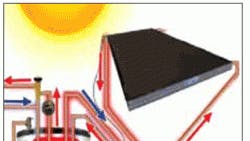Make Your Business Shine With Solar Thermal
Every one of your customers needs hot water. Every one of your customers would like a 20 to 30% return on investment. And every contractor would like to offer a product that’s not weather-dependent, opens up new markets, and provides a good gross margin.
That’s why offering solar thermal systems is a “no-brainer” for the HVAC industry.
We’re all looking for products that can stabilize our business and even out the weather-related hills and valleys. In this quest, we’ve generally focused on maintenance agreements. As people need hot water all year, offering solar water-heating helps even out our overhead and our revenue cycle so we can stay stable season after season.
You can install solar thermal systems with your current people. Think about it: even though we’re not licensed electricians and plumbers, we already do plumbing and electrical work. We don’t care of toilets and sinks, but we braise and solder and deal with water lines for pieces of equipment, whether it’s condensate drain lines, water supply lines to evaporative coolers, humidifiers, and so on. We’re very well-skilled in working with systems in attics, on roofs, and inside equipment room.
With a two-man crew, solar thermal systems are a simple one-day installation. It’s just like HVAC. You send a crew out and they collect the same day. And the gross margins are very good.
From the homeowner’s perspective, there are a tremendous number of rebates and incentives available, which makes this a great opportunity for homeowners.
Beyond the upfront incentives, the power of a solar hot water system is the return on investment. Yes, people like to be green, they like to be environmentally friendly, but being good and green has to make cost-effective sense. The power of the investment in a solar system is that homeowners can get a complete payback in as little as three years. For example, where In Arizona, the first year return on their investment can be as much as 70%. In addition, homeowners will continue to receive about a 30% return on their investment through their energy savings from free hot water, every year in years 2 through 25—the life of their system.
Baby boomers are worried about outliving their money, and they’re looking for the best return on investment. A solar system can show consistent and guaranteed returns of 20 to 30% for a 25-year period. Their financial planner has nothing like that.
The opportunity is there for us. Solar right now is dominated (as many trades are) by “mom and pop” businesses that don’t have the business acumen that is needed to succeed today. The HVAC contractor who is looking at ways to diversify his or her business is in many ways ahead of the average company in the trades. In many cases, these companies want to save the planet, but they don’t have a business plan. They don’t have any way to get recurring revenue, like we do with maintenance agreements. They’re subject to the whims of that marketplace, and they’re not used to dealing with high-ticket items like we are in the HVAC business.
Solar is a new technology but it’s also proven technology. There are no moving parts. Think about an HVAC system. We have to size it right, install it right, have the right ductwork, the right refrigerant lines, the right refrigerant charge, and the right controls, and only then is it going to deliver comfort. Plus, you have come back every year and maintain it. With solar thermal, you put it in place, keep the panels clean, and it’s basically a done deal.
Offering solar thermal provides diversification for your business, and increases your customer base, especially among customers who are thinking green. It can be sold to existing customers, regardless of how recently they upgraded to a new HVAC system. It’s a marvelous add-on to an existing HVAC retrofit sales division.
It also makes for a good business partnership with the green movement. Make your presence known, and you’ll get referrals from insulation companies, window people, and others who are involved in home performance and green practices.
There is room for tremendous growth in this market, too. Although solar thermal is mainly being used for domestic water heating, you can consider space heating options using solar thermal with a hot water coil in an air handler. We also are seeing ductless split systems that are fired by photovoltaic panels. Now is the time to stake your place in your community as the solar experts.
Louis Hobaica is president of Hobaica Services, Phoenix, AZ. The company was ContractingBusiness.com’s 2011 Residential Contractor of the Year. He can be reached at 602/995-0387 or by email at [email protected].
Jim Hinshaw is founder and president of Sales Improvement Professionals Inc., Fort Collins, CO. He can be reached at 970/635-5675 or by e-mail at [email protected].
Simple Steps to Bringing Solar Onboard
It’s not difficult to add solar capabilities to your company. The technology is easily handled by your current installation teams. When we entered the solar market, the only person we added was a solar salesperson. That built credibility in our company. It helped everyone buy-in to have an expert on staff.
We also created a worksheet and calculator to show customers the rebates and incentives. It’s a powerful selling tool to help homeowners understand what they’re getting for their investment, and to demonstrate the real power of their investment.
Finally, we created a solar brochure for our company, as well as put solar in all of our marketing to add it to our identity. We didn’t want to leave any doubts that we are the solar experts in our area. —Louis Hobaica
